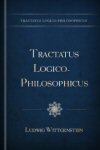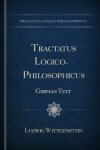Tractatus Logico-Philosophicus (2 vols.)
Digital Logos Edition
Overview
What is the relationship between language and reality? That’s the question that Ludwig Wittgenstein attempted to answer in the seven propositions of his Tractatus Logico-Philosophicus. Begun while Wittgenstein was on the front lines of WWI and completed when he was a POW in an Italian prison camp, the Tractatus is the only book-length philosophical work published during Wittgenstein’s lifetime. The book had a major impact on the development of logical positivism, and Bertrand Russell’s Philosophy of Logical Atomism is a working out of Wittgenstein’s propositions.
The book contains seven main propositions, followed by a varying number of sub-propositions. The statements are intended to be self-evident; they are given no logical support or explanation. One of Wittgenstein’s overarching goals in the Tractatus is to show that much of philosophy is meaningless. He drives this home with the seventh propositon, which states, “Whereof one cannot speak, thereof one must be silent.”
The digital edition of the Tractatus allows you to jump right to a particular proposition or sub-proposition with a click. Every word is indexed, allowing for quick searches and easy cross-references. Open the German and English together for a side-by-side comparison. And use the dictionary lookup tool when you find difficult words.

Key Features
- Original German and an English translation
- Introduction by Bertrand Russell
- Extensive index
Praise for Ludwig Wittgenstein
. . . the most perfect example I have ever known of genius as traditionally conceived, passionate, profound, intense, and dominating.
—Bertrand Russell
Product Details
- Title: Tractatus Logico-Philosophicus
- Author: Ludwig Wittgenstein
- Publisher: Routledge & Kegan Paul
- Volumes: 2
- Pages: 208
Individual Titles
This title is included in the following collections
You can save when you purchase this product as part of a collection.
Modern Philosophy Research Lib...
$499.99$499.99Philosophy Research Library (1...
$799.99$799.99Verbum 8 Diamond Legacy Librar...
$2,999.99$2,999.99Verbum 9 Diamond Legacy Librar...
$2,999.99$2,999.99
- $4,749.99
- $4,749.99
- $4,749.99
- $7,749.99
- $7,749.99
- $21,749.99
- $24,999.99

This volume contains C. K. Ogden’s English translation of Tractatus Logico-Philosophicus.
About Ludwig Wittgenstein
Ludwig Wittgenstein (1889–1951) was born in Vienna, Austria. His father, Karl Wittgenstein, was a wealthy art patron who commissioned works by Rodin. The family was very well connected with the European art world; Gustav Klimt painted Wittgenstein’ sister’s wedding portrait, and both Brahms and Mahler gave regular concerts for the family. All the Wittgenstein children were educated at home to prepare them for business. When he was 14, Wittgenstein attended the technical Realschule in Linz. In 1906, Wittgenstein studied engineering in Berlin, earning a diploma in 1908. From there, he went to Manchester to do doctoral studies in aeronautics. While in Manchester he developed a love for logic and mathematics and, at the suggestion of one of his friends, went to Cambridge to study with Bertrand Russell, who came to regard Wittgenstein as a true genius. In 1913, Wittgenstein moved to Norway, where he wrote his Logik. During WWI, Wittgenstein volunteered to serve on the front lines, where he wrote various notes that would eventually become the Tractatus. Following the war, Wittgenstein gave away his inheritance and enrolled in teacher training school. He eventually returned to Cambridge, where he submitted his Tractatus as his PhD dissertation and became a fellow of Trinity College. In 1939, Wittgenstein became the professor of philosophy at Cambridge and also, to escape the Nazis, a British citizen. During WWII, he served as a hospital porter in London under a pseudonym. He died of prostate cancer in 1951.
